What Is the FSH Test? + [Normal Range for Male & Females]
Fertility Treatment![What Is the FSH Test? + [Normal Range for Male & Females] How Is FSH Interpreted?](https://hws.raadinahealth.com/images/user_upload/blog/fsh/4_1658308694_medium.webp)
The FSH test is one of the common procedures in identifying male and female fertility issues, and it is carried out by receiving a blood sample. There is a stimulating hormone in men's and women's reproductive systems called FSH (Follicle follicle-stimulating hormone), which primarily aids in the growth of ovarian follicles and the occurrence of the menstrual cycle in women's bodies. In addition, the FHS hormone and testosterone are required in the male body to maintain the number of sperm and the normal function of sperm. The FSH normal range differs according to the age and sex of people. In men, balanced FSH is between 1.4 to 15.4 mIU/mL, while normal FSH levels in females still menstruating ranges between 4.7 and 21.5 mIU/mL.
The FSH test allows the doctor to identify issues such as the causes of both male and female infertility, early puberty, low sperm counts in males, missing ovulation in women, etc. Since your hormonal condition affects the type of fertility treatment, you should know the FSH test's normal range, how it is performed, and how you can interpret its results.
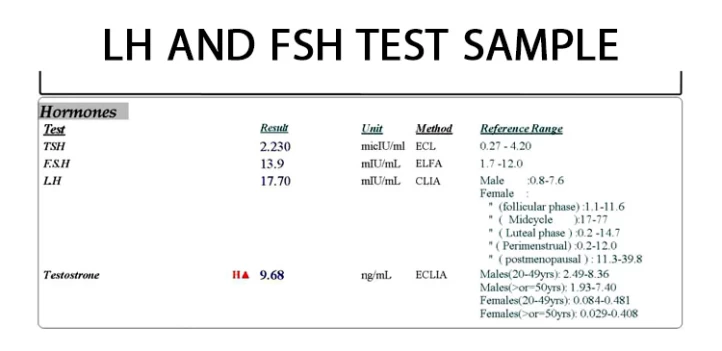
What Is Follicle-Stimulating Hormone (FSH)?
FSH, also known as follicle-stimulating hormone, is one of the hormones produced by the pituitary gland in the brain, whose production and secretion are regulated by other hormones. In other words, the FSH hormone is regulated by a few hormones made by the hypothalamus, pituitary, and reproductive glands, like the testicles (in males) and ovaries (in women).
Gonadotropin-releasing hormone (GnRH), which triggers the production of FSH and LH (gonadotropins), should be included among the hormones the hypothalamus produces. On the other hand, follicle-stimulating hormone can impact both the ovaries' and testicles' function.
What Is the Normal Value of the FSH Test in Men and Women?
The FSH test normal range in men is approximately 1.24 to 16.4 IU/L; however, the normal FSH level in females is calculated based on the stage of the menstrual cycle at the time of the test, as follows:
- Follicular Phase: 1.37 to 9.9 IU / L
- Luteal Phase: 1.09 to 9.2 IU / L
- Ovulation Peak: 6.17 to 17.2 IU / L
- Postmenopausal: Period 19.3 to 100.6 IU / L
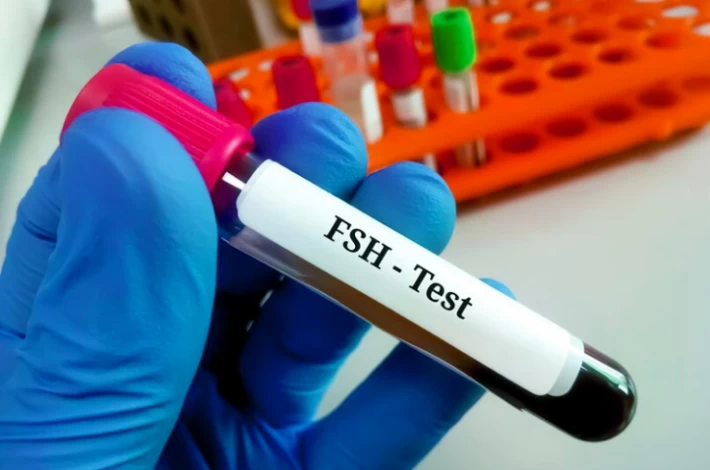
FSH Test Results in Men and Women
To determine whether the FSH level is normal, some factors should be considered, such as age, gender, the stage of the woman's menstrual cycle on the day of the test, and the requirements of the preferred laboratory for releasing the results. The normality of FSH levels in each laboratory is determined based on the method used for measuring this hormone.
It should be stated that numerical values less than 10 indicate a low level of FSH hormone in women, and values between 10 and 20 indicate an average level. In contrast, values between 10 and 15 indicate the normal level of this hormone in men. Additionally, if the test is repeated and readings higher than 20 are obtained, the likelihood of a natural pregnancy may be decreased (particularly in older women).
The FSH test generally determines ovarian reserve in women and is often administered on the second or third day of the menstrual cycle. If the ovarian reserve is normal, enough hormones are secreted. Therefore, by reducing FSH in the ovary, the body helps stimulate the ovary by increasing the production of this hormone.
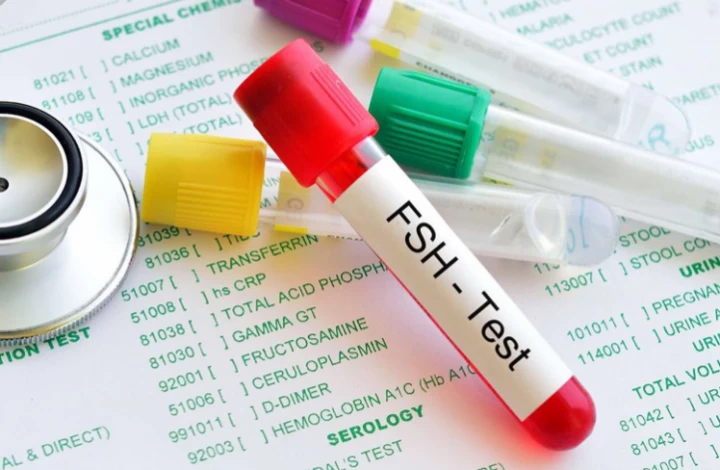
FSH and LH Test Readings in Men
FSH and LH test in men is carried out to assess hypogonadism (hypogonadism), examine the low sperm count, and assess testicular incontinence. The following issues may be present in males whose test results suggest a high level of FSH:
- A missing testicle or its dysfunction;
- Klinefelter syndrome (Male hypogonadism caused by an extra X chromosome);
- Chemotherapy or X-ray exposure-related testicular damage;
- Testicular dysfunction caused by alcohol abuse;
- Pituitary insufficiency;
- Idiopathic or precocious puberty.
If, on the other hand, the FSH test results show that the level of this hormone is lower than normal, it is frequently caused by the following issues and diseases:
- Inadequate pituitary and hypothalamic function in the brain;
- The reproductive system's inability to produce sperm;
- The existence of brain tumors;
- Experiencing constant and severe stress;
- Excessive thinness.
FSH and LH Test Readings in Women
The FSH test is typically performed along with LH, estradiol, and progesterone tests to determine the amount of ovarian reserve. This is because as women age, their chances of generating high-quality eggs for pregnancy decrease.
Bear in mind that women have a lower chance of natural pregnancy when their FSH level rises, and they may need to use assisted reproductive technology to get pregnant. So, what is a normal FSH level to get pregnant? Based on the recent findings, 10mIU/ml of FSH is ideal for conceiving naturally.
While normal FSH levels in females ensure a healthy body and pregnancy, a high level of FSH can be a sign of the following problems:
- Premature puberty;
- Menopause's onset and menstrual problems;
- Ovarian function disruption and ovarian failure occurring;
- Polycystic ovary syndrome caused by hormonal imbalance and ovarian cyst formation;
- Decrease in the process of producing high-quality eggs or sperm for pregnancy;
- Chromosome diseases like Turner syndrome, which is characterized by partial or complete absence of the female X chromosome;
- Sheehan syndrome or postpartum pituitary hypofunction
- Enzyme deficiencies;
- Androgen insensitivity syndrome;
- Klinefelter syndrome;
- Infections like mumps;
- A certain autoimmune disease;
- Damage to glands and hormones due to radiotherapy and chemotherapy.
As opposed to this, the following issues can lead to low FSH levels in women:
- The ovaries' inability to produce eggs;
- Experiencing a brain tumor and having an FSH hormone production disruption;
- Improper pituitary and hypothalamic gland function;
- Hypothalamic dysfunction (Kallman syndrome);
- Anorexia Nervosa;
- Hemochromatosis.
Preparations Required for The FSH Test
Before performing the FSH test, consult your doctor for information on the essential precautions and care. The most crucial step before having this test is to inform your doctor about all the medications you are taking, especially radioisotopes, as well as any current or potential pregnancies.
Be aware that medications including clomiphene, cimetidine, levodopa, and digitalis typically elevate FSH level, while anticonvulsants, birth control pills, hormones, phenothiazines, and multivitamins containing biotin or vitamin B7 decrease it.

Which Diseases Affect the Results of the FSH Test?
The following diseases might affect the results of an FSH test:
- Orchidectomy (surgical removal of the testicles);
- Anemia or sickle cell anemia;
- Gonad failure;
- Unusual vaginal bleeding;
- Pituitary tumor;
- Sex hormone tumor.
When Is an FSH Test Prescribed?
The FSH test is performed depending on the doctor's diagnosis. It may usually be prescribed under the following conditions:
- Clinical suspicion of hypothalamic or pituitary dysfunction symptoms;
- Clinical suspicion of premature or delayed puberty in children and adolescents;
- Observing female infertility issues, amenorrhea, or irregular periods;
- Reduced libido, low sperm count, and low muscle mass in men.
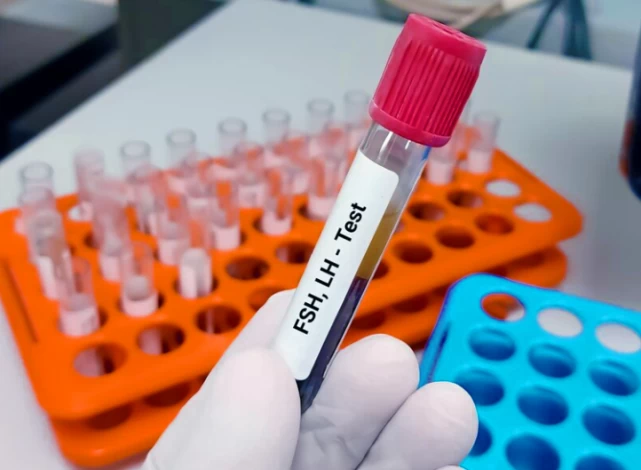
FSH Test in Women
As previously stated, the FSH test has diverse applications in women and men. In women, it is typically performed in conjunction with full hormonal tests to examine the following issues:
- Identifying the cause of infertility and selecting the best course of action;
- Determining the cause of period irregularities, including short or extended bleeding periods and heavy or light bleeding;
- Investigating the kind and origin of ovarian dysfunction, particularly about egg growth and production;
- Identifying potential issues with the operation of brain glands like the hypothalamus and pituitary and starting treatment;
- Predicting the onset of menopause and attempting to delay early menopause.
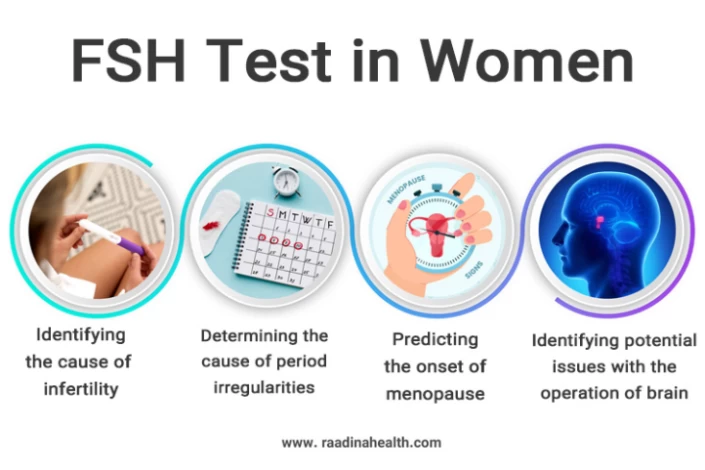
What Are the Main Reasons for FSH Testing in Men?
Examining the following concerns and problems is the primary purpose for performing the FSH test on men:
- Reasons for the low sperm count in the semen sample (hormonal factors related to FSH);
- Examination of hypogonadism or gonad failure;
- Examining the way testicles work and looking for diseases that affect these glands, particularly testicular hormonal issues.
FSH Test for Menopause and Fertility
As was already noted, a woman's FSH test can estimate her level of fertility and menopause onset. Determining a woman's ovarian reserve—which refers to her reproductive potential given her age—is the most crucial task in the field. Ovarian reserve, which reveals how long a woman will have the opportunity of a healthy and safe pregnancy, genuinely reveals the quantity and quality of eggs in the ovary.
FSH tests are usually not required after menopause; however, if any symptoms are present, the doctor may recommend repeating this test several times to better understand the changes in FSH hormone levels.

FAQs About FSH Test
1) What is the FSH level during menopause?
If you missed your periods for a year and the results of your blood test have shown “FSH level above 30”, your menopause has begun.
2) What is the FSH test for?
An FSH test determines the amount of follicle-stimulating hormone in the blood. The pituitary gland produces this hormone, one of the most crucial elements influencing how the human reproductive system and sexual function develop. As a result, an imbalance in the FSH hormone affects male and female fertility in multiple ways.
3) What is a normal FSH level for getting pregnant?
The FSH is not the only hormone affecting fertility; women of reproductive age must have 4.7 to 21.5 mIU/mL of FSH in their blood when trying to conceive. It should be noted that the best FSH level for pregnancy is 10 mL.
4) What is the difference between LH and FSH?
Technically, FSH is a gonadotropin required for the normal function of ovaries and testicles. Hence, an abnormal level of this hormone results in low sex cells in both men and women. LH is a heterodimeric glycoprotein that works with FSH to mature the egg follicles, increase the progesterone level, and support the early stages of pregnancy.
5) What should I do before the FSH test?
There is nothing special to do before the FSH test. However, your doctor may ask you to stop taking certain medications or supplements a few days before the test.
6) When should an FSH test be done?
Women can take the FSH test on days 2, 3, or 4 of their menstrual cycle, but it is suggested that they take it on day 3.
7) Is FSH a fertility test?
This test assesses the level of follicle-stimulating hormone. The results show how many eggs are left in women’s ovaries and their chance of pregnancy—whether naturally or by ART methods. So, the FSH test is a fertility test.


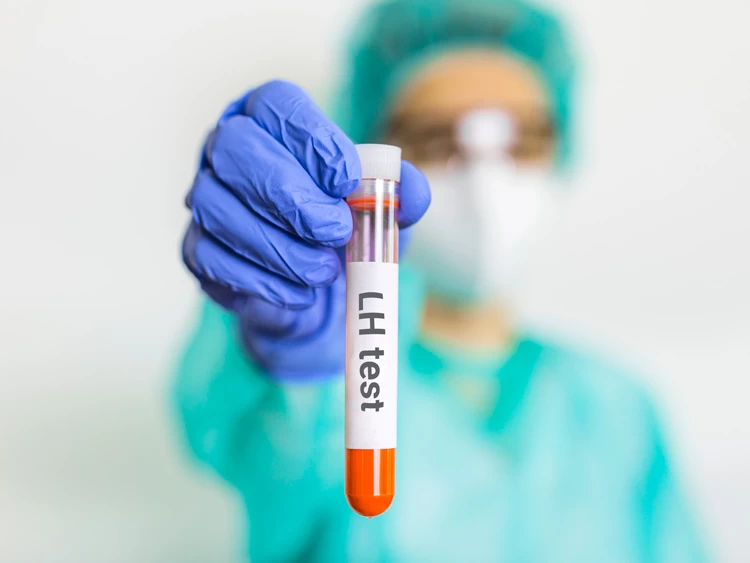

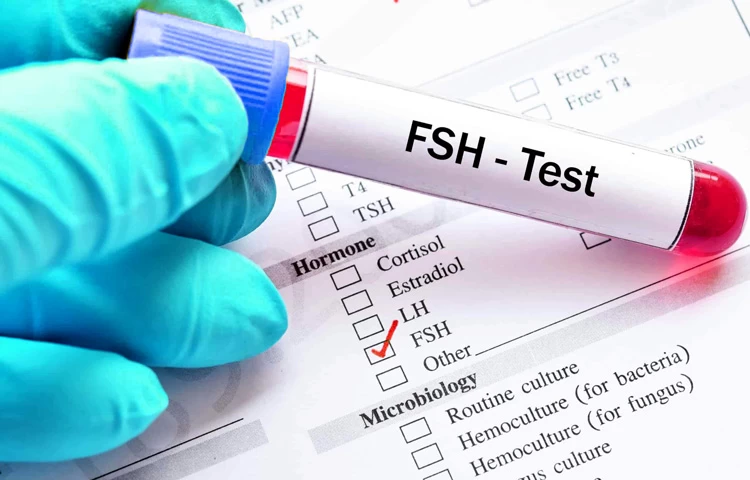
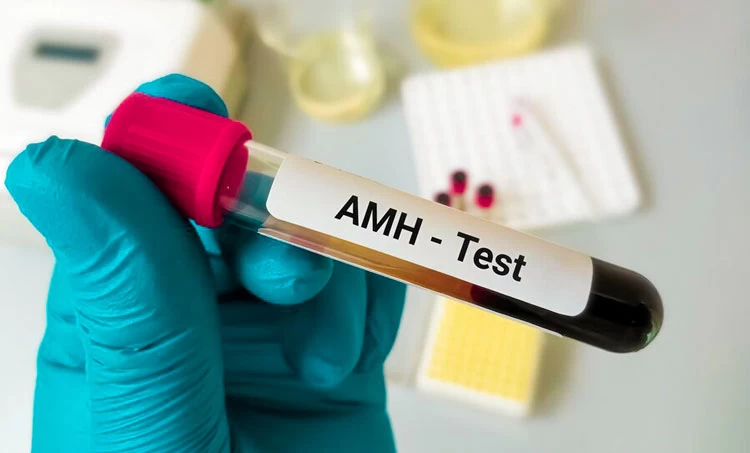
No reviews
Your comment